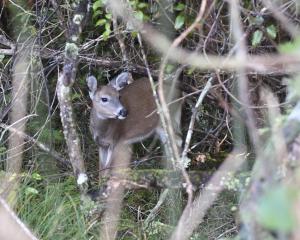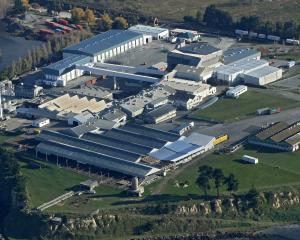
Dung Beetle Innovations co-owner Shaun Forgie, of Auckland, spoke at a Beef + Lamb field day in Nigel and Leanne Woodhead’s woolshed on their farm near Milton this month.
Dr Forgie proposed to the Government introducing dung beetles to farms across New Zealand.
"They don’t want to know about it, which is frustrating."
The proposal was for a $33 million project to roll out dung beetles across farms over a decade.
Once the roll-out was complete, the national dung beetle population would multiply over another decade, to a point where they would reach a critical mass, burying the manure of grazing herbivores in up to 48 hours, which would improve water quality, he said.
He had pitched the idea to many policymakers and about a dozen regional councils and had no success.
"There’s a lot of talkers and not a lot of doers — which seems to be entrenched through the policy-making process, but we will keep trying."
He believed catchment groups might have more influence than he had.
"No-one is listening to me."
The former Landcare Research scientist said the Environmental Protection Authority allowed 11 exotic species of dung beetle to be released in New Zealand in 2011.
Commercial company Dung Beetle Innovations, including a mass rearing facility of the insects, was launched in Whenuapai in 2014.
"It’s the world’s biggest mass rearing facility for insects — to feed all these beetles we shovel about 5000kg of shit a week."
The exotic beetles provide "extraordinary" economic and ecological value.

Livestock and machinery had compacted soil on farms, Dr Forgie said, reducing its ability to infiltrate rainfall and fertiliser, leading to surface run-off and reduced pasture productivity and water quality and the degradation of soil health and increased erosion.
An army of adult dung beetles can colonise fresh livestock manure and, in a heavy soil, could burrow the manure up to 60cm below the surface.
In a female beetle’s lifetime, she placed up to 70 eggs inside individual pieces of buried manure.
"The population explodes exponentially."
Depending on the beetle species and the season, the time it could take an egg to reach adulthood was between six weeks and six months.
About two-thirds of a manure ball in the soil remained after an adult emerged from it.
"It’s left in the ground as a fertiliser resource."
The beetle buried such a big manure ball to protect its egg from temperature fluctuations.
Studies had shown dung beetles had significantly increased the root biomass and growing depth of pasture and significantly improved the water holding capacity and drought tolerance of paddocks, Dr Forgie said.
Research on paddocks on an 11 degree slope containing dung beetles and a range of soil types had shown an 81% reduction in the overland flow of sediments and contaminants, such as nitrogen and potassium, in a severe rainfall event, compared to similar paddocks without any beetles.
"That’s a significant finding in a New Zealand context, where water quality is a major problem for us," Dr Forgie said.
Research had also shown that to improve water quality, a whole catchment needed to fence and plant its waterways, which was costly and often uneconomical, he said.
Dung beetles cost between $10 and $40 per hectare.
According to Dr Forgie, the most cost-effective way to improve water quality was by using the three mitigation tools of dung beetles and riparian planting and fencing in key areas.

He believed if dung beetles were used, the width of riparian buffers could be reduced from the recommended 10m to 2m, increasing the amount of pasture available for grazing.
Cows and sheep in New Zealand produced about 100 million tonnes of manure each year, he said.
If the manure remained on pasture and was not buried it was a missed opportunity to be used as fertiliser.
Manure left on pasture created "zones of repugnance" and livestock avoided grazing an area five times the size of the footprint of the manure. The zones reduced the amount of pasture available to livestock for grazing, sometimes for months at a time, depending on the season.
Dung beetles could make a substantial contribution to keeping the forage fouling to a minimum.
Many studies, local and international, had shown that, following dung beetle activity, livestock had a 76% drop in the numbers or reinfection rates of gut parasites.
Reasons for the reduction included dung beetles increasing oxygen in manure, drying up the parasites.
Also, if a beetle buried manure containing a parasite below 15cm in the soil, the parasite larvae was not capable of reaching the surface.
Dung beetles could help farmers be less reliant on drench for killing parasites.
Answers Dr Forgie gave to questions from the crowd included confirming dung beetles were attracted to the manure of all grazing herbivores, sheep manure had enough moisture for a beetle to work with and beetles would follow as a farmer rotated stock on their farm, he said.
Another question farmers frequently asked him was whether dung beetles released on their farm would fly over to a neighbouring farm.
"The answer is yes."
Studies had shown the "advanced scout" beetles fly about 1km a year searching for manure on a sheep and beef farm.
Dr Forgie concluded his speech by quizzing the about 50 people at the event.

The prize was a $2000 colony of dung beetles.
Sheep farmers Hamish and Julie Dalziel, of Tuapeka West, was in the audience at the event.
Mr Dalziel, speaking to Southern Rural Life at a tea break, said he bought and released dung beetles on his 299ha farm two years ago.
"It’s a no-brainer."
It was "mind-boggling" the Government was not using dung beetles as part of its plan to improving water quality.
Mrs Dalziel hoped the dung beetles would one day bury the manure of her three horses to save her the job of clearing it.
They had released three of the four dung beetle species available at Dung Beetle Innovations and were waiting on delivery of the final species.
Their postie was given a heads up of the impending delivery of a colony, so the box of up to 500 beetles could be left in shade by the doorstep rather than in a hot letterbox.
The beetles were then placed inside a pile of fresh sheep manure on a sheltered area on the farm, Mr Dalziel said.
"Set and forget."
New Zealand Landcare Trust paid for Dr Forgie to speak at the event.
Trust Otago regional co-ordinator Nicole Foote, of Dunedin, said farmers in the South had a strong interest in dung beetles and it was likely the trust would bring Dr Forgie back to speak about the benefits of the insect including increasing pasture production, soil health and water quality.
"It’s another tool in a farmer’s toolbox."
Agriculture Minister Damien O'Connor did not respond before deadline to questions about why the Government did not take Dr Forgie up on his proposal and what part, if any, the Government sees dung beetles playing in improving freshwater quality in New Zealand.














